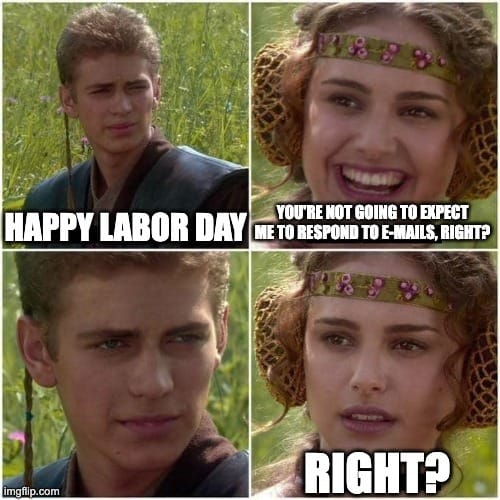Sponsored by RockWater
Time for another special edition!
I’m giving advice from my 20 years building some of the industries most impressive digital departments, primarily around digital talent.
This will be angled towards people who work directly with talent representation, and those who worked on my teams likely heard many of these before.
So many times they’ll roll their eyes when they read them again.
And please note: this is not advice on how to build the most profitable org as fast as possible. I could teach you that, but then you’d be blacklisted from the industry and no one will want to work with you again after your massive exit. This is for building an ethical business that will ensure a joyous career with a great reputation and, yes, become a millionaire along the way.
And hopefully those of you who aren’t talent representatives, including start up founders, creators, social media enthusiasts, or just fans of my writing will get value.
So the sponsored slot gets bumped to the top and after that, I’ll get into my top 10 hottest tips to build high growth talent representation organizations!
SPONSORED BY ROCKWATER
How to prep your creator business for a sale.

RockWater advises owners in the creator economy on the sale of their business. We have the largest buyer network, and negotiate the best deals possible for our clients. We’re proud to be the industry’s top M&A advisor.
We recently advised Lionize, an influencer marketing platform, on their sale to gen.video. We’ve also advised Long Haul Mgmt (sold to Wasserman), Bottle Rocket Mgmt (sold to Night), Bounty (sold to gen.video), and have many more deals yet to be announced.
If you want a POV on your company’s valuation and readiness for a sale, reach out to to [email protected] to setup an intro call.
Still with me? Good.
Let’s get into it:
Stop lying to your employees by telling them the company is like a ‘family’. It's not. You would fire them in a heartbeat if it meant better long-term (or, more and more recently, short-term) positive outcomes for your shareholders. It's emotional blackmail, and it's cruel. At best, your company is like an elite basketball team. The opportunities to win (personal brand, financial incentives, 'championships') are so strong that they're excited to try to make it on the court.
Be enthusiastic about team members, talent, and brands seeking legal help. If an employee wants to talk to a lawyer about an employment contract, severance agreement, stock incentive plan, or anything else to do with their rights, your answer will be, "Of course!" And you'll mean it! They have the right to understand what they're signing and understand industry norms. And if you're on the level, that shouldn't bother you, right?
Don’t over-build. Over-partner. Building technology and initiatives is slow, risky, and expensive. If someone else in the industry is already doing A+ work that would be valuable to your creators, they’re often thrilled to partner with talent representation orgs. Only build if you feel like you’re going to get an ROI from having something exclusive, which can lead to more revenue or more talent signings. Don’t, and I mean this in 100% of cases, build something just because ‘technology adds enterprise value.’ Most VCs aren’t dumb. They’ll see your tech stack, do a quick Google search, then say, “Why did you build this when there’s a $2b company focused exclusively on doing that at the highest level?”
Let team members leave with grace and dignity. If it's an employee you wanted to keep, losing them is your failing. And business is full of these failures. And that's okay. If you built a great org, you can recover. If they're being fired with cause, you can also be kind. Tell them why, have empathy that their life is turned upside down, and give them next steps. You don't have to be a doormat, but you lose literally nothing by being upfront and professional.
For the love of everything that's in the year of our lord 2025, let your team build their brand on social media! Yes, to properly build a personal brand they aren't going to be constant commercials for your company. They may even say something that you gasp disagree with! Have guardrails of course. If someone on your team decides to blast your biggest client on Twitter, that's bad and actionable. If they're choosing not to share your latest cringey 30-second video spot, respect that. There's probably a reason. Oh, and give them actually entertaining things they can do for their social media! For example, the beehiiv team has the 🐝 emoji after their name on LinkedIn. Fun!
Make success about goals, not ‘butts in seats’. I once had a boss take a picture of the bullpen where my team was working at 6:30pm and said, “Where is everybody?” I was at a bit of a loss. At that time the team was exceeding their goals, they would often e-mail and message at all hours of the night and weekends, and the general rule in the office was that the expectation was to work 9 to 6. I mean, the contract said it was a 40 hour per week job. But they wanted members of the team to grind. And that led to many of their top employees leaving for other companies that respected their boundaries. There’s no shortage of companies that will pay a manager top dollar if they have a strong roster, after all.
Talent management is time management. If you want to build your own career in talent representation or inspire an entire team, focus on time management. Can this 1 hour meeting be a 20 minute meeting? Can that 20 minute meeting be a 5 minute phone call? Can that 5 minute phone call be a text? The best talent managers are always asking themselves, “Is this the most valuable thing I could be doing for my clients.” That’s why I’m constantly re-prioritizing my Asana list throughout the day.
Ideas are cheap. “I’m an ‘ideas’ person!” That’s nice. Go write a book. Talent representation lives and dies by execution. There are talent managers who do reasonably well convincing creators to sign with them. Then there are no brand deals, no career movement, no connections made. I tell talent managers to always have three big things they’re doing for all of their talent that they’re moving forward every week. If the talent is ‘too small’ to deserve you working on three initiatives, you should probably drop that talent for both of your sakes.
Be curious. If you’re working in the creator economy, that means you’ll be meeting vloggers and singers and comedians and acrobats and beauticians and everything in between. And the more you learn about all of these worlds, the better you’ll be able to service your client. In the past year I’ve found myself reading up on military history, watching YouTube dating shows, taking pictures of the shelves at GNC, and hopping on the phone with my old personal trainer to talk about yoga classes, all in the name of learning on behalf of my clients. And from that, I have multiple highly profitable business lines in flight due greatly to what I learned from these experiences.
This industry is very, very, very small. I’m proud to say at this point of my career, most opportunities I have are inbound. People with budgets know what I know and that I’ll make a fair deal to help them execute. I’m not saying I haven’t made mistakes through my career. I’m sure there are plenty of people who would have choice words about me (and I’m lucky to know who many are, as it seems to almost always get back to me!) But I’m proud to say that the complaints are often ones I wear with a badge of honor: he focused too much on his team, he was over-stressing operations and organization, he would push back on authority when he didn’t agree, he would ask “why?”, he took big swings at new technology and platforms and some wouldn’t pan out (but, of course, some would!) And because of this, this very small industry keeps me around even though my hair is starting to gray.
Honesty time: I wrote 20 tips and cut it down to my favorite 10. There’s so much to learn from this dynamic industry, but also so much to gain.
Another thing I tell my managers that I’ll leave you with: “When you learn this, you’ll never starve. As long as you have an internet connection, you can always reach out to creators and say, ‘Need a manager?’ then reach out to brands and say, ‘Want to work with my talent?’”
Happy Labor Day to those who celebrate! Now let’s hit it hard going into Q4!
MEME ZONE:

Just checked and I responded to 72 e-mails on Labor Day…FML…
Thank you for reading! If you enjoyed this edition, give it a share and if you get someone to sign up, I’ll send you my ‘10 Rep-Friendly Ways to Monetize Today!’ deck!
Until next time, protect yo rep.


